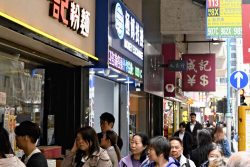14:22 JST, December 10, 2020
To prevent global warming, there is a rapid increase around the world in the number of initiatives aiming to switch from gasoline-powered vehicles to those powered by electricity and other cleaner energy sources. The Japanese government also must accelerate efforts toward this goal in tandem with the private sector.
The Economy, Trade and Industry Ministry is set to compile a target of having all new cars sold domestically be “electrified vehicles,” a category that includes electric vehicles (EVs), in the mid-2030s.
The government aims to achieve net-zero greenhouse gas emissions by 2050. In fiscal 2018, 16% of Japan’s carbon dioxide emissions came from automobiles. To achieve the emissions goal, it is essential for the nation to shift to electrified vehicles.
The United Kingdom will ban the sale of new gasoline cars by 2030, with hybrid vehicles also to be subject to the measure in 2035. In the United States, the state of California will reportedly ban the sale of new gasoline-powered cars, including hybrids, by 2035. China, the world’s largest automobile market, also plans to make EVs the mainstay of new car sales by that year.
While Tesla Inc. of the United States and other manufactures overseas are increasing their sales of EVs, Japanese automakers have low presence. For Japan to be left behind in this field, it will likely lose its competitiveness in the automobile industry, a key sector for the nation, causing Japan’s entire economy to be hit hard.
According to the industry ministry’s definition, electrified vehicles include not only EVs and fuel cell vehicles, which are powered by hydrogen, but also hybrids and plug-in hybrid vehicles that can be recharged at home.
Of new cars sold in Japan in 2019, nearly 40% were electrified vehicles according to the definition, but most of them were hybrids, which also use gasoline. As long as the government aims to achieve net-zero greenhouse gas emissions, the focus of its support should be EVs and fuel cell vehicles.
In providing such support, there are many issues involved, such as lowering the relatively high prices for these products and increasing the number of charging facilities and hydrogen refueling stations.
Innovation in battery technology, a key component of EVs, is also important. Japanese makers, which used to have an edge in developing batteries, have been losing ground in recent years to their Chinese and South Korean rivals.
Batteries directly affect the performance of electric vehicles and account for about 30% of the total manufacturing costs. Therefore, they determine the prices for EVs. It is hoped that expanding support for production and development of these vehicles will help lower their prices and extend their traveling distance on a single charge.
Japan notably lags behind other countries in the number of quick charging stations. The government should take the initiative in accelerating the setting up of such facilities.
Toyota Motor Corp. has mass-produced fuel cell vehicles, a world first. Japan reportedly has an advantage in hydrogen technology. Although there are still only a few hydrogen refueling stations, it is easy to introduce this type of vehicle for trucks and buses as many of them run on fixed routes. It is necessary to devise effective measures to promote fuel cell vehicles.
Even if more and more EVs run on roads, effects would be limited unless power plants can reduce greenhouse gas emissions. It is important to expand the use of renewable energy and restart nuclear power generation.
— The original Japanese article appeared in The Yomiuri Shimbun on Dec. 10, 2020.
Top Articles in Editorial & Columns
-

40 Million Foreign Visitors to Japan: Urgent Measures Should Be Implemented to Tackle Overtourism
-

University of Tokyo Professor Arrested: Serious Lack of Ethical Sense, Failure of Institutional Governance
-

Policy Measures on Foreign Nationals: How Should Stricter Regulations and Coexistence Be Balanced?
-

China Provoked Takaichi into Risky Move of Dissolving House of Representatives, But It’s a Gamble She Just Might Win
-

PM Takaichi Should Help Young Japanese Break Seniority Barrier to Vitalize Politics
JN ACCESS RANKING
-

Japan Institute to Use Domestic Commercial Optical Lattice Clock to Set Japan Standard Time
-

Israeli Ambassador to Japan Speaks about Japan’s Role in the Reconstruction of Gaza
-

Man Infected with Measles May Have Come in Contact with Many People in Tokyo, Went to Store, Restaurant Around When Symptoms Emerged
-

China Eyes Rare Earth Foothold in Malaysia to Maintain Dominance, Counter Japan, U.S.
-

Prudential Life Insurance Plans to Fully Compensate for Damages Caused by Fraudulent Actions Without Waiting for Third-Party Committee Review


















